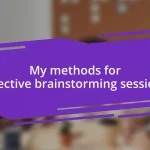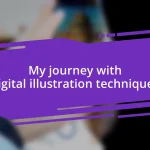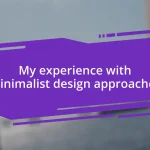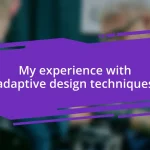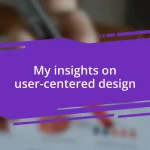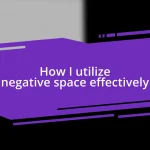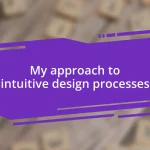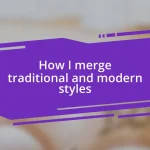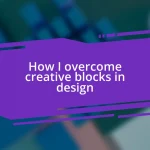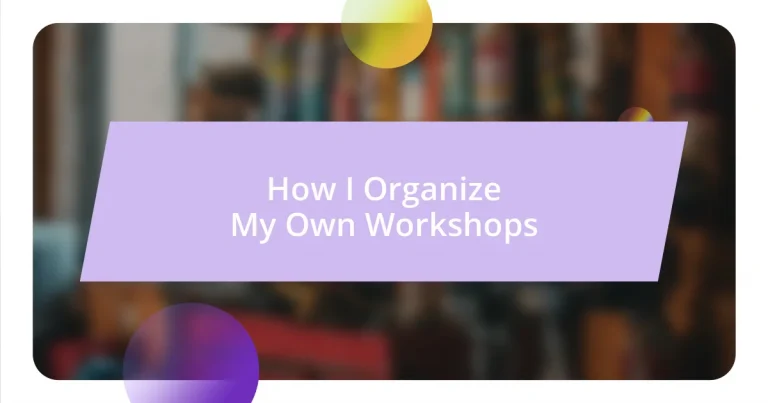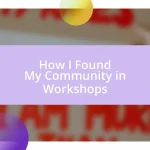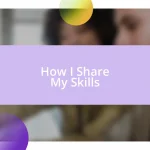Key takeaways:
- Defining clear, actionable workshop goals fosters engagement and excitement among participants.
- Selecting the right format and venue enhances participant interaction and overall experience.
- Regularly evaluating feedback and outcomes helps refine workshops and identify new opportunities for improvement.

Defining workshop goals
When defining workshop goals, I always start by asking myself what I truly want attendees to take away from the experience. For instance, during my last workshop, I aimed not just to share knowledge but to ignite genuine passion for the subject. I found that setting clear, actionable goals helped me create a more focused and impactful session.
Reflecting on past workshops, I realized that vague objectives often led to confusion among participants. One time, I approached a workshop without well-defined goals, and I could sense the disengagement in the room. Have you ever experienced that moment when you can tell the energy just isn’t there? It taught me the importance of clarity in objectives—specific goals foster engagement and enthusiasm.
I recommend taking time to articulate both short-term and long-term goals for your workshop. Think of it as mapping out a journey; if your destination is clear, the route becomes easier to navigate. I’ve noticed that when I outline my goals in advance, I can tailor my content and activities to meet those aims, which keeps everyone on the same page and excited about the journey ahead.
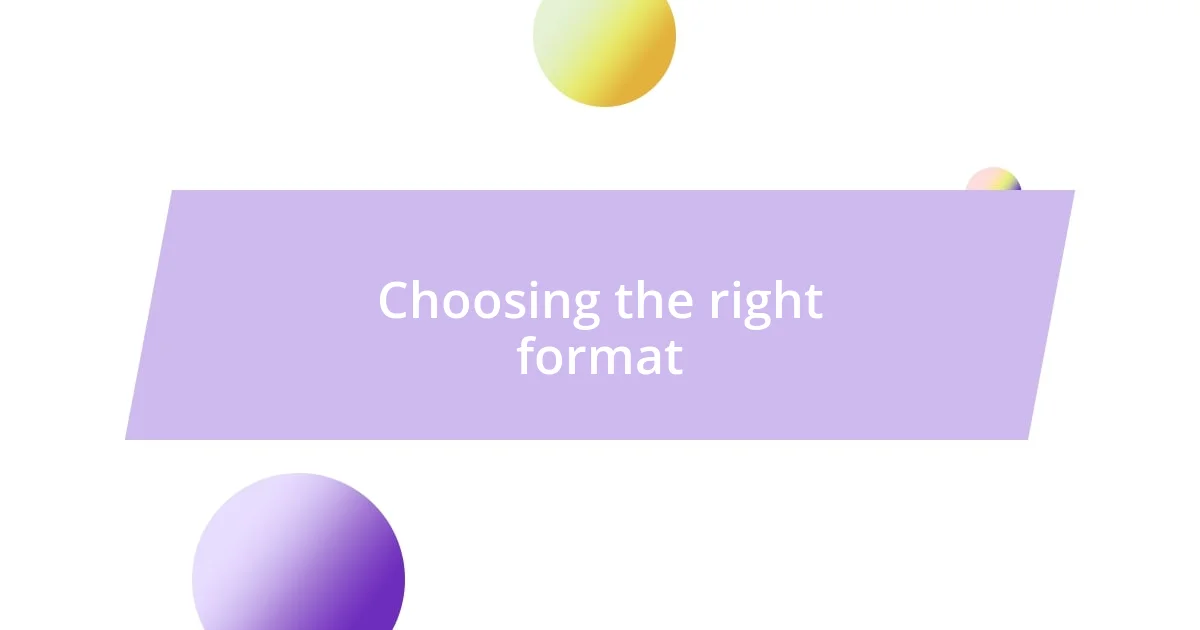
Choosing the right format
Choosing the right format for a workshop really hinges on understanding the audience and the content. I’ve experimented with various formats, from hands-on interactive sessions to more traditional lecture styles. Each time, I noticed how the chosen format directly influenced the participants’ engagement levels. For example, a small group roundtable format I tried last year fostered deep discussions and allowed for more personal connections among attendees. This approach left me feeling energized by the shared insights and lively exchanges.
Here are some commonly used workshop formats to consider:
– Lecture-based: Ideal for imparting knowledge; best for larger audiences.
– Hands-on activities: Great for skill-building and engagement; promotes collaboration.
– Roundtable discussions: Perfect for sharing experiences; encourages participation.
– Webinars: Useful for reaching remote participants; effective for presenting information.
– Breakout sessions: Enables smaller, focused group work; enhances interaction and collaboration.
Choosing the right format is about more than just delivery; it’s about creating an environment where attendees feel inspired and included. Remember, each format can evoke different emotions and levels of engagement, so consider what fits best with your workshop goals and audience needs.
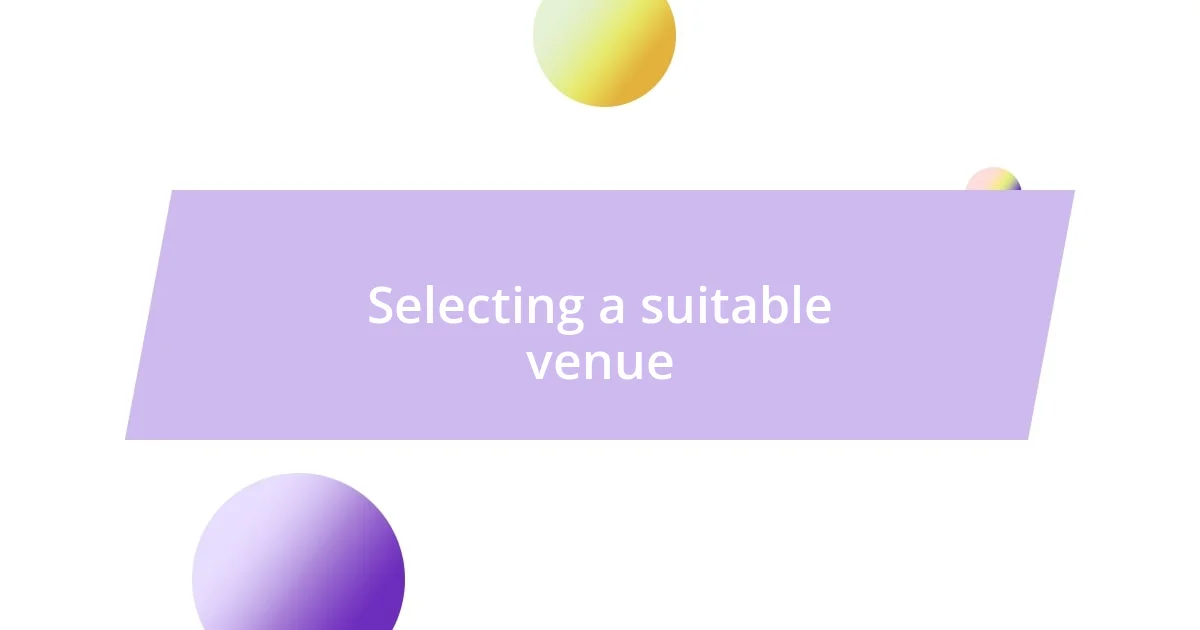
Selecting a suitable venue
Selecting the right venue for a workshop significantly shapes the overall experience. From my experience, I’ve learned that the atmosphere can either spark creativity or dampen enthusiasm. A spacious, well-lit room fosters engagement, while cramped, poorly lit spaces tend to drain energy. Once, I held a workshop in a basement — although it was cozy, the confined environment made it challenging for attendees to fully engage. Have you ever felt stifled in a space? It’s a feeling I strive to avoid in my workshops.
Accessibility is another crucial factor when choosing a venue. I recall a time when I selected a beautiful, trendy location that seemed perfect, but its remote setting made it hard for many participants to attend. It taught me the value of ensuring that a venue is conveniently located and accessible for all potential attendees. Also, considering facilities like parking, public transport links, and wheelchair access can make a big difference—those little details really add up.
Lastly, I like to think about the vibe and amenities of the venue. Are there breakout rooms for small group activities? Is there a space for refreshments? During one workshop, I underestimated the impact of coffee breaks. Those short, casual exchanges can foster connections and rejuvenate minds. The right venue not only provides a physical space but also enhances the workflow, making the entire experience memorable and valuable.
| Venue Aspect | Considerations |
|---|---|
| Atmosphere | Spacious, well-lit environments foster engagement vs. cramped rooms which may drain energy. |
| Accessibility | Convenient locations with parking and transport options are essential for attendance. |
| Amenities | Look for spaces with breakout rooms and refreshment areas to enhance the overall experience. |
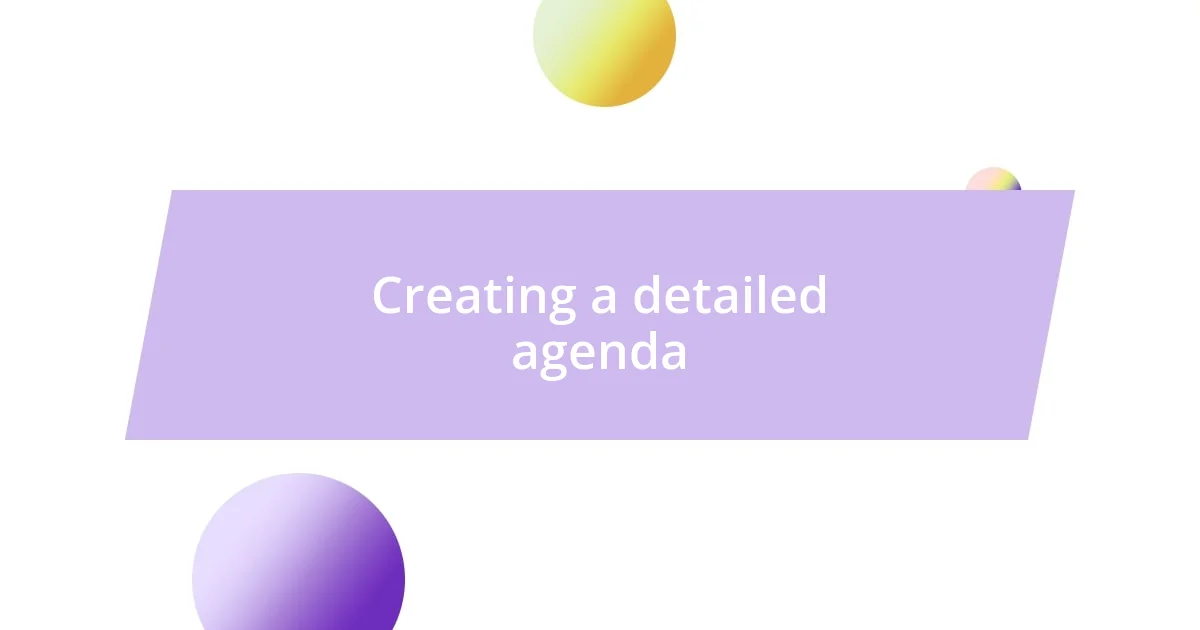
Creating a detailed agenda
Creating a detailed agenda is absolutely crucial for the flow of a workshop. I often start by outlining the main objectives I hope to achieve. When I drafted my first agenda, I realized how vital it is to allocate time for each section, ensuring there’s a balanced mix of content delivery and participant interaction. Have you ever been in a workshop that felt rushed? It’s uncomfortable, and I’ve found that a well-timed agenda drastically enhances the overall experience for everyone involved.
I also believe that transparency in the agenda builds trust with participants. When I share the plan at the beginning, I can sense a shift in their comfort level. They appreciate knowing what to expect and when to engage. For instance, I once included a mid-session feedback period. This not only offered participants a chance to voice their thoughts but also allowed me to adjust my approach on the fly. Have you tried incorporating participant feedback into your agenda? It can be a game-changer!
Finally, I always make space in the agenda for unexpected discussions or questions, as some of the most enriching moments arise spontaneously. From my perspective, leaving room in the schedule for organic conversations encourages a community feeling among attendees. It also gives me the flexibility to delve deeper into topics that resonate with the group. Isn’t it rewarding when a workshop takes on a life of its own? That’s the magic of a thoughtfully crafted agenda.
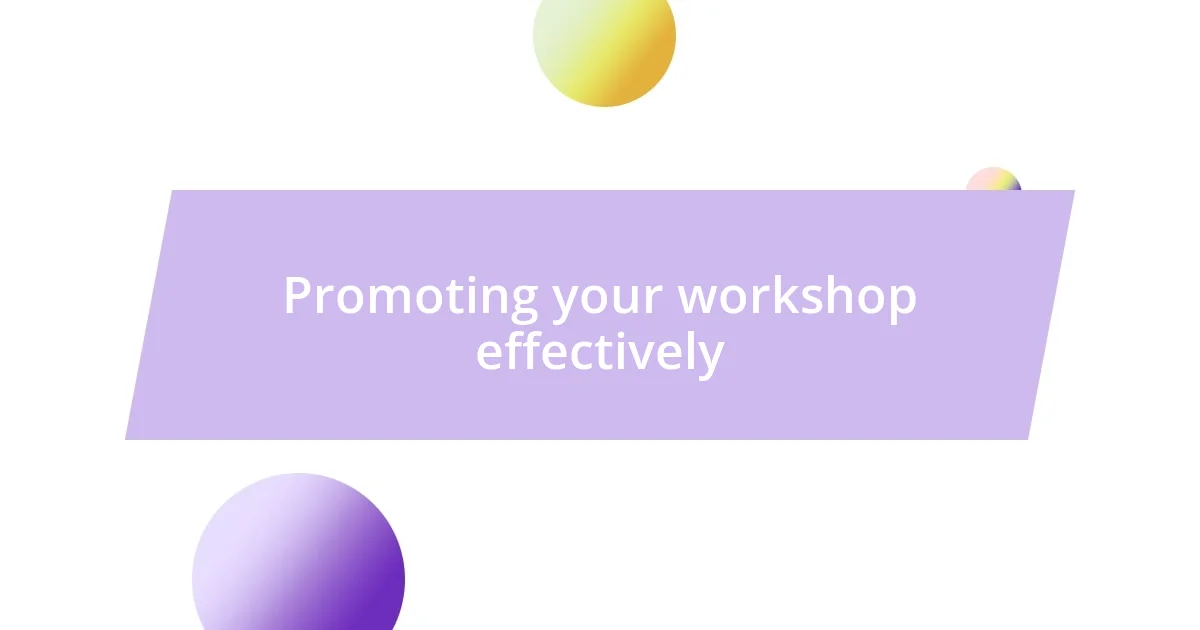
Promoting your workshop effectively
Promoting a workshop effectively is a skill that requires a personal touch. I often find that using social media platforms is a great way to reach diverse audiences. When I promoted my last workshop through Instagram stories and posts, the engaging visuals really drew attention. It was fascinating to see how a simple “behind-the-scenes” sneak peek generated excitement and anticipation among potential attendees; have you ever experienced the buzz that comes with a well-timed social post?
Email marketing is another tool I swear by. Crafting personalized messages to my previous participants makes them feel valued and included. I usually segment my email list to tailor content specific to their interests or past workshop themes. This approach has led to higher open rates and ultimately more sign-ups. I remember sending a targeted email about a new photography workshop and getting multiple replies asking for more details, which reassured me that personal connection truly drives engagement.
Don’t underestimate the power of word-of-mouth referrals! After one of my workshops, a participant shared her experience on her blog. The glowing review not only brought in new inquiries but also boosted my credibility in the industry. It made me realize that genuine testimonials can be more effective than any advertisement. Have you ever considered asking your attendees to spread the word? Their enthusiasm can be your most powerful tool!
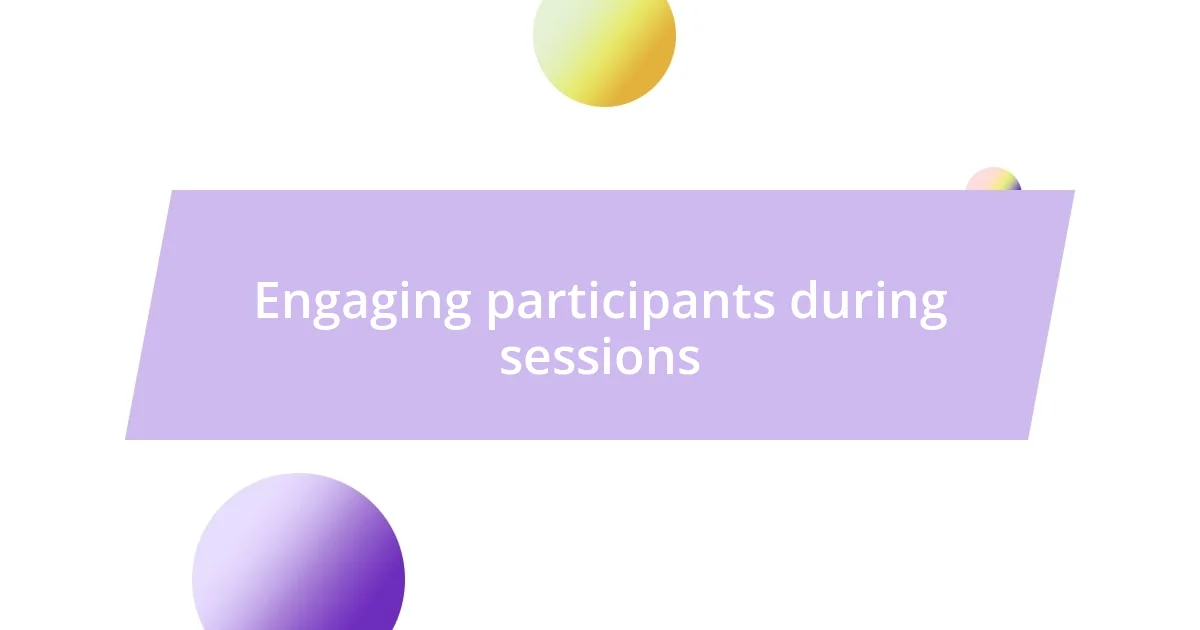
Engaging participants during sessions
Engaging participants during sessions is one of my favorite aspects of workshop facilitation. One technique that consistently works for me is asking questions early on. For example, during a recent workshop on creative writing, I posed a question about participants’ biggest challenges. The room instantly sparkled with energy as ideas bounced around, and people found their voices, sharing struggles and triumphs alike. Aren’t those moments when everyone feels seen, a key part of connecting?
I also love incorporating hands-on activities to keep energy levels high. During a marketing workshop I led, I set up small group discussions where participants brainstormed campaign ideas. Each group was buzzing with excitement as they collaborated, and I could see the “light bulb” moments occurring. Watching participants actively problem-solve not only deepens their understanding but creates lasting bonds within the group. Have you noticed how shared experiences can forge a sense of community?
Finally, I think laughter itself plays a pivotal role in engagement. I’ve learned that a lighthearted approach can disarm tension and enhance focus. During a particularly intense session about public speaking, I shared a funny personal story about my very first presentation—where I accidentally read my grocery list instead of my speech! Participants erupted in laughter, and suddenly, the atmosphere felt relaxed. It reminded everyone that we are all human and, often, it’s those relatable moments that turn an ordinary session into an unforgettable experience. What stories have you shared that brought your group together?
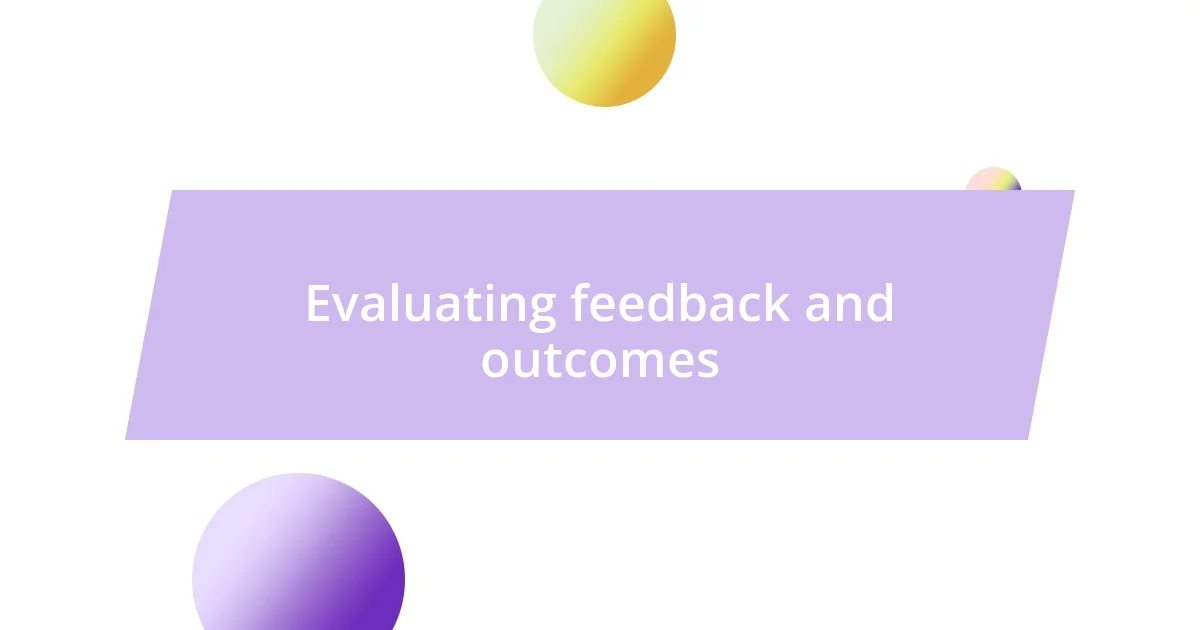
Evaluating feedback and outcomes
Evaluating feedback and outcomes is crucial for refining my workshops. After each session, I typically use simple surveys to gather participants’ thoughts on content and delivery. One time, I noticed that while most feedback praised the interactive elements, some attendees felt that the pacing was a bit rushed. Have you ever experienced that unexpected insight that changes your approach?
Diving deeper into the comments often reveals trends I might not have initially recognized. For instance, following a workshop on digital marketing, several participants shared their desire to explore social media analytics in more detail. This sparked an idea for a follow-up workshop, proving that attendee feedback can create exciting new opportunities. Don’t you find it fascinating how direct communication can lead to fresh insights?
Sometimes, I take a moment to reflect on my own feelings about the workshop. How did I feel during the session? Did I notice the same engagement as previous workshops? I trust my instincts here. Recently, I left a workshop feeling energized—not just from the participant feedback but from the engagement that I felt in the room. That’s when I realized that evaluating outcomes is not just about numbers—it’s about the emotional resonance of the entire experience. What do you usually look for in your own reflections?
